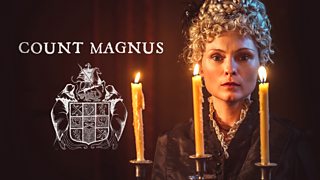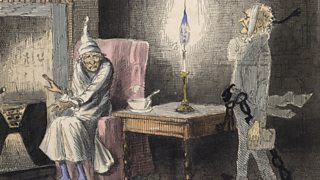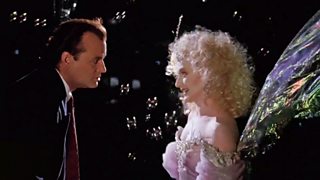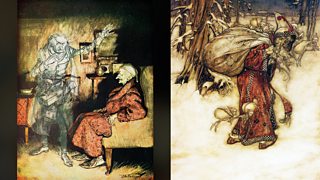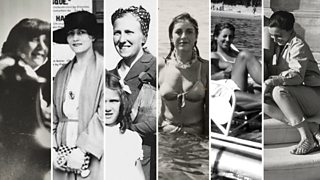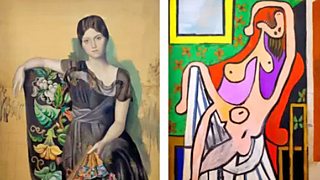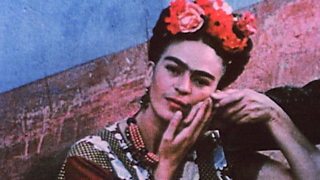Is there still a place for panto in the 21st Century?
30 November 2018
"Panto season", wrote one actor earlier this year, "seems to consistently normalise casual racism for the next generation". So should theatres be moving on from the genre altogether? Or, asks BRUCE MUNRO, is there a fresh path that can guide these famous characters past the potential pitfalls around race, gender and sexuality?
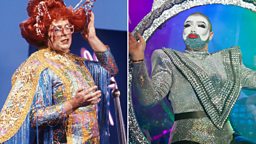
Racism waiting in the wings?
Actor and writer Maryam Hamidi was checking her emails in July when she spotted an advert from casting website Spotlight looking for performers to audition for the role of "" in Aladdin at the Bedworth Civic Hall. She posted a screengrab on Twitter, describing it as another example of panto normalising casual racism.
The advert was quickly removed and the theatre apologised, changing the name of this character and that of another, PC Pong Ping. Local newspaper The Coventry Telegraph canvassed for opinion on social media and reported that the .
Hamidi is not the first actor to speak out about the portrayal of race in pantomime. In 2017, Irene Ng expressed serious concerns in a panel event .
All the humour […] was taking the mick out of people in a derogatory way, whether someone is blind, handicapped, ‘ugly’, or of a different race.Irene Ng
She said: "Pantomime makes the dominant culture, or colour, feel better about themselves. All the humour was taking the mick out of people in a derogatory way, whether someone is blind, handicapped, ‘ugly’, or of a different race.
"And why do I always find that happens to be people of the Chinese race? Whether that’s Siamese twins, whether that’s Wishee Washee, [the character] always has bad features or a terrible accent, and that in itself is supposed to be the joke."
Earlier this year Daniel York Loh cited . He has little time for the position that this is justified as a reaction to political correctness. Loh argued: "Are we actually arguing that racist jokes and reducing other races to exotic fancy-dress costume is wholesome entertainment for Caucasian families in the British provinces?"
The character names in Aladdin are rooted in dated attitudes towards Chinese people. Wishee Washee is a clear reference to Chinese business interests, says Dongshin Chang, an academic who has written on the portrayal of Chinese characters on the London stage.
: "Due to a combination of factors (discrimination, low capital requirements, minimal contact with customers), the laundry trade was indeed the main business of the British Chinese in the early 20th Century.... Underneath the fun and entertainment, the association with laundry may also be considered a manifestation of prejudice."
Panto history expert Simon Sladen that the Hackney Empire, however, is adapting the character names in Aladdin this year to make references that will have resonance for the local audience. In place of Ping and Pong or Sergeant Pingpong and PC Pongo, Sergeant Dumplin and Constable Ackee are used, referencing Caribbean dishes.
Director Susie McKenna told him: "The change of names was deliberate. We set our stall out from the beginning about being multicultural, diverse and modern. Pantomime has to move on and evolve as tastes change, attitudes change and cultural politics change."
McKenna has also long sought to have diverse casts in her productions, was a revelatory idea back in the 1990s when "the only black actors in panto were token baddies".
Italian origins
In this film, Michael Grade explores the history of the traditional theatrical character in Britain.
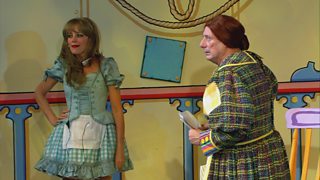
Stereotyping or opportunity?
The portrayal of race is not the only question raised by critics of panto. Writer Eugene Grant has written about his , arguing that they create an image which is limiting for people who look like him.
He explains: "Stereotypes don’t allow you to be yourself because others define your power and identity for you... I also think the depictions of dwarfism in Snow White are degrading. Think about it: seven dwarf people who are each so one-dimensional in character they can literally be summed up as a single emotion or state of being."
The depictions of dwarfism in Snow White are degradingEugene Grant
Dwarf performers have not been cast by Qdos Entertainment, who are responsible for dozens of major pantomime productions every year, since the 2010/11 season. That does not mean characters they once played have disappeared, though, rather these parts are going to non-dwarf performers.
It has been claimed that this change is made because dwarf actors are, on average, paid significantly more for pantomimes. The company , with casting on each show "considered individually as part of the creative process".
Peter Burrows of Willow Management Dwarf Acting Agency . He said: "When they [dwarf actors] are available and they’re still using tall people, I think they’re putting short people out of work.”
Warwick Davis, co-runs the agency with Burrows as well as performing in on film, TV and stage, believes this change is not what the audience wants. : "Some people say it’s a matter for political correctness but if you ask the audience, they’d much rather have a short actor than other performers on their knees."
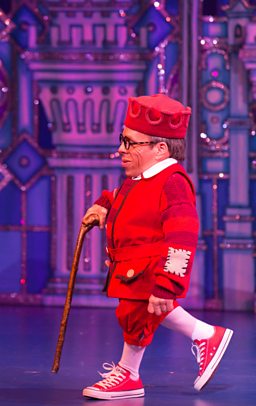
Innuendo a no-go?
While sexual innuendo is an established part of pantomime, producers have been known to make amendments to avoid offence. Qdos Entertainment removed a routine from their 2017 shows in which a male character looks up a female performer's skirt.
I’ve seen a lot of pantos in my time but this was a step too farAnonymous teacher
Managing Director Michael Harrison said: "Last Christmas it was in nearly every panto in the land, including the Palladium, but this year it just feels wrong. What I have not done and what I won’t do is change any jokes, as I don’t believe there is a link between sexual harassment and pantomime. Nobody touches anybody in pantomime."
That change did not stop one of their shows at Manchester Opera House from hitting the headlines for its sexual content. Natalie Wood submitted an official complaint that Dick Whittington, starring the Krankies and John Barrowman, was "too smutty".
A teacher who took her class to see the show said she felt the same way. She told the ����ý: "I've seen a lot of pantos in my time but this was a step too far - all the staff agreed it was wholly inappropriate." Qdos stated that double entendre was part of the panto tradition and there was no intention to cause offence.

Top dames
-
![]()
Five of the most influential performers from days gone by
Evolution of the format
That's not to say, however, that these critics are looking for pantomimes to disappear completely. In his article Daniel Loh York is clear in his desire for the format to adapt.
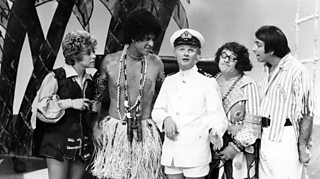
He wrote: "Nobody’s looking to dumb down panto. By acknowledging and taking into account the cultural melting pot that is modern Britain, I would argue that we’re asking it to be more appreciative of complex racial and societal nuance."
In some cases the answer might be avoiding some particularly troubling productions altogether. For example, that there is only one professional adaptation of Robinson Crusoe happening in 2018.
The other option is to keep traditional titles but remove the offensive parts of the content. (Sladen also argues that Crusoe has been staged relatively recently but with changes to the .)
While panto has always played with gender roles on the stage - male performers have long played female roles in the genre and vice versa - a number of shows this year are exploring different approaches.
In Sevenoaks, Danny Beard's take on the dame in Dick Whittington, the Spirit of London, will be neither male or female.
: "[A] gender-neutral [person] is someone who doesn't conform to the stereotype or the rules that society traditionally set out in gender. This year it has been written into the show, which is really special. It has a platform which it wouldn't have. This is why I wanted to work with the pantomime producers - they wanted me to be a magical character. I think it's important that it's a hot topic at the moment. It's a reflection of what is going on in the world."

In Scotland Johnny McKnight has developed a strong reputation for spinning traditional Christmas stories on their head with shows like Alice in Weegieland and Miracle on 34 Parnie Street. His new show at the Tron, Mammy Goose, features a same-sex romantic storyline.
Jack falls for a boy, which is something I thought it was time forJohnny McKnight
: "Jack falls for a boy, which is something I thought it was time for. There’s a reason that Scotland is leading the way on LGBT; we’re very fortunate to be in that position and it’s something worth celebrating."
A Pair of Pantos, which is touring parts of England, is mash-up of two traditional shows - Dick Whittington and Jack and the Beanstalk.
Writer Hester Chillingworth says: "Having found myself watching mainstream pantos for a few years in a row recently, I became really uncomfortable with how many rely on devices of casual transphobia (as well as racism)... This is my attempt to offer an alternative to a traditional pantomime – one which celebrates the form and the joy of the playfulness, but which refuses to rest lazily on problematic and debasing depictions and gags."
spent many years working on Christmas shows in Glasgow and Edinburgh and is now fostering the next generation of performers at the Royal Conservatoire of Scotland. Ducking out from technical rehearsals for their Christmas show, Peter Pan, he was wholeheartedly supportive of the evolution of the format.
He said: "I’m really fascinated by the changes that have been happening recently. There’s a new generation of artists coming through for whom these questions of gender and race are much more in their practice and in their DNA than it was for my generation. It’s a natural process of development here just like there is in society.
"That’s not to say there aren’t the people who feel it’s due to an excess of political correctness. But ultimately, when we start to break the rules and change the rules, it’s never a bad thing – it leads to some exciting storytelling."

CBeebies panto
-
![]()
Thumbelina
Find out how to watch their 2018 Christmas Show
Arts Unwrapped
-
![]()
Mark Gatiss on the Christmas ghost story
With Count Magnus coming to TV, The League of Gentleman and Sherlock star reveals why he loves a festive fright
-
![]()
Is this the real Ebenezer Scrooge?
The possible inspiration behind Dickens' Ebenezer Scrooge, literature's most famous misanthropic businessman
-
![]()
Kermode on Christmas: Dark secrets and bad Santas
Mark Kermode's recipe for the perfect Christmas movie... there's one for every taste
-
![]()
The magical worlds of Arthur Rackham
Christmas gift books and the Golden Age of Illustration with A Christmas Carol, Peter Pan in Kensington Gardens and The Night Before Christmas.
More from ����ý Arts
-
![]()
Picasso’s ex-factor
Who are the six women who shaped his life and work?
-
![]()
Quiz: Picasso or pixel?
Can you separate the AI fakes from genuine paintings by Pablo Picasso?
-
![]()
Frida: Fiery, fierce and passionate
The extraordinary life of Mexican artist Frida Kahlo, in her own words
-
![]()
Proms 2023: The best bits
From Yuja Wang to Northern Soul, handpicked stand-out moments from this year's Proms


